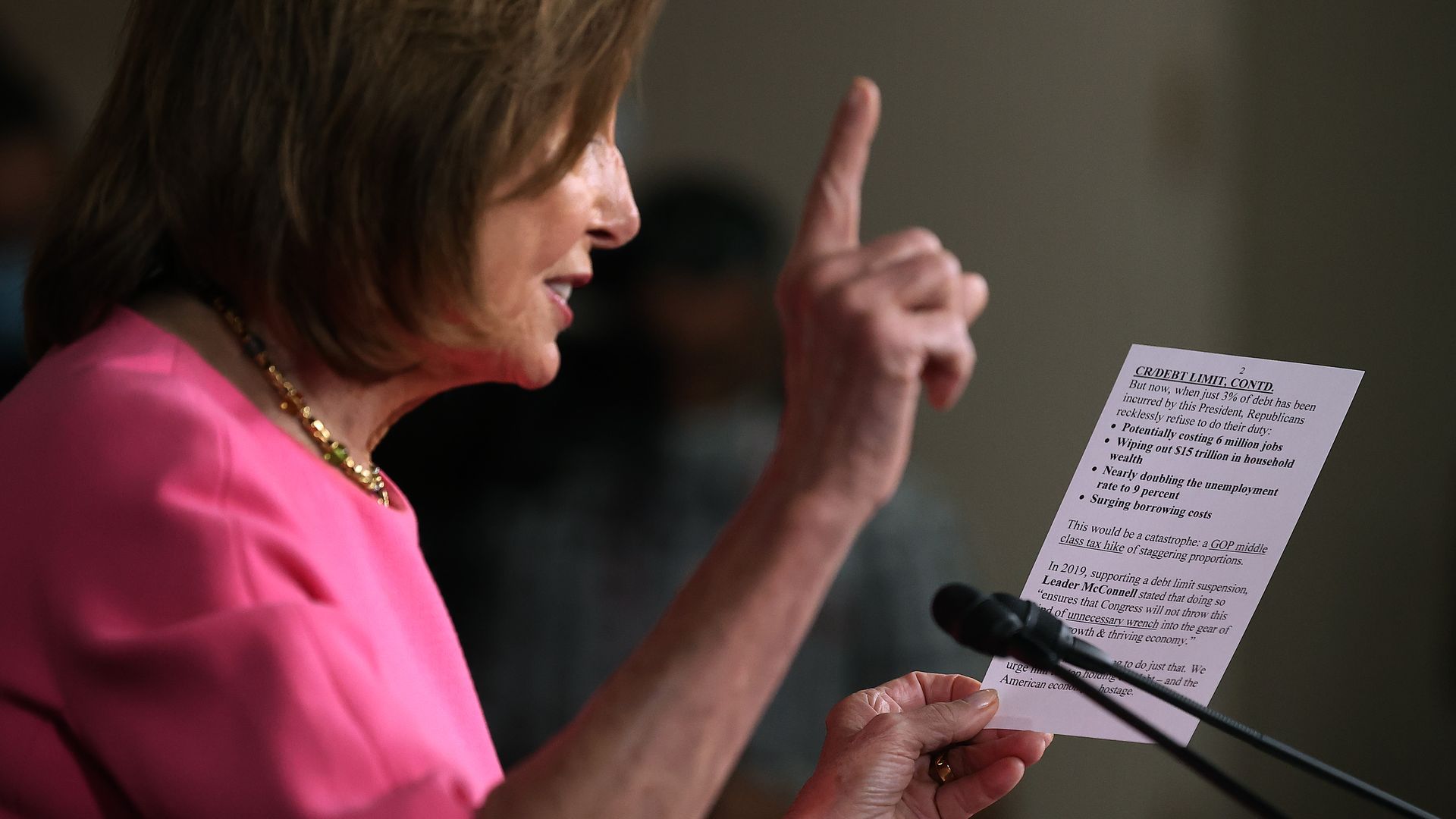| | | | | | | Presented By HCA Healthcare | | | | Axios Sneak Peek | | By the Axios Politics team ·Sep 23, 2021 | | Welcome back to Sneak. Things settled down after a few hectic days on both ends of Pennsylvania Avenue. 🚨Breaking: "Jan. 6 select committee subpoenas four Trump aides." Smart Brevity™ count: 1,524 words ... 5.5 minutes. Edited by Glen Johnson. | | | | | | 1 big thing: GOP attacks its own |  | | | Illustration: Sarah Grillo/Axios | | | | Republican super PACs are beating up on the party's own candidates in key Senate primaries while Democratic groups largely hold their intra-party fire, an analysis by Axios' Lachlan Markay found. Why it matters: The negative ads some Republican groups are directing at GOP candidates threaten to elevate damaging stories about them ahead of competitive fights that could determine control of the 50-50 Senate. Between the lines: The risk isn't just the quantity or volume of Republican-on-Republican attacks; it's their brutal tone. - Jobs for Our Future PAC, which supports Pennsylvania Republican Senate candidate Jeff Bartos, has spent $166,000 going after Republican rival Sean Parnell.
- It recently began airing a 60-second ad focused on protection from abuse orders obtained against Parnell by his estranged wife and "sexist rhetoric" from his media appearances. (Parnell has said the orders were found to be meritless and were quickly dismissed.)
- In North Carolina, the Club for Growth has spent $120,000 attacking Senate candidate and former governor Pat McCrory, with ads accusing him of steering subsidies to "a company owned by the Chinese Communist Party."
- Saving Arizona, a super PAC backing Senate candidate Blake Masters, has spent over $225,000 accusing Republican rival Mark Brnovich of being insufficiently supportive of former President Donald Trump.
The other side: Pennsylvania Lt. Gov. John Fetterman has faced his share of incoming fire from Democrats as he seeks his state's Senate nomination. - The Collective Super PAC's $110,000 in ad buys opposing Fetterman focused on a 2013 incident in which he held a young black man in his neighborhood at gunpoint while police were dispatched. (Fetterman has denied pointing a gun at the man and said the incident was not racially motivated.)
- Those anti-Fetterman ads, though, are the only reported instance so far this cycle of a Democratic super PAC going negative against one of the party's Senate candidates.
What they're saying: "Outside organizations are going to do what they can to best support their candidate," Doug Heye, a veteran Republican operative, said during an interview. "That can have a weakening effect for whoever emerges going into the general election." - Steven Law, the CEO of the Senate Leadership Fund, a super PAC allied with Senate Minority Leader Mitch McConnell (R-Ky.), said it's too early in the cycle — and the ad buys too small — to predict dire consequences for the party's candidates.
Keep reading. |     | | | | | | 2. Republicans' secret lobbying |  | | | Illustration: Shoshana Gordon/Axios | | | | The five Senate Republicans who helped negotiate and draft the $1.2 trillion bipartisan infrastructure bill have been privately courting their Republican colleagues to pass the measure in the House, Axios' Alayna Treene reports. Why it matters: House GOP leaders are actively urging their members to oppose the bill. The senators are working to undercut that effort as Monday shapes up as a do-or-die moment for the bipartisan bill. - Progressives say they have dozens of Democrats ready to sink the measure, given they insist the House first pass President Biden's $3.5 trillion "soft" infrastructure package.
- House Speaker Nancy Pelosi (D-Calif.) has promised centrist Democrats she would pass the $1.2 trillion bill by Monday.
- That deadline has made unlikely allies of centrist Democrats and Senate Republicans.
Sen. Rob Portman (R-Ohio) told Axios he spoke yesterday with "a number of my [Republican House] colleagues." - They include Rep. Brian Fitzpatrick (R-Pa.), the Republican chair of the Problem Solvers Caucus.
- Portman also met this week with Rep. Josh Gottheimer (D-N.J.), the Problem Solvers' Democratic leader. Both Fitzpatrick and Gottheimer have pushed to pass the bipartisan bill first before moving on to the larger reconciliation bill.
- In addition, Portman said he's spoken with moderate Democrats in the Senate — whom he refused to name — in the hope they'll also help lobby their House counterparts during next week's expected vote.
The latest: The push has intensified after the House Republican leaders formally announced yesterday they were trying to line up votes against the $1.2 trillion bill. - House Minority Whip Steve Scalise (R-La.) told Axios in a phone interview he's spoken with "a number" of Senate Republicans "and, clearly, this is an area we don't agree on."
- Scalise said the bill "is bad policy" regardless of whether it's tied to the reconciliation package, claiming it "has little to do with infrastructure."
- House Minority Leader Kevin McCarthy (R-Calif.) also opposes the bipartisan bill, and claims it's directly tied to the $3.5 trillion proposal.
What they're saying: Sen. Bill Cassidy (R-La.) said he "wished [Scalise and McCarthy] wouldn't" whip against the bipartisan bill. - "The idea that we're going to maybe pass a better bill sometime in the future is a clear version of a theoretical bird in the bush, when you have a bird in the hand."
Keep reading. |     | | | | | | 3. U.S. friends in Latin America turn to China |  Data: World Bank and Observatory of Economic Complexity; Chart: Kavya Beheraj/Axios China is winning friends and gaining influence in Latin America — to the detriment of the United States, Ecuador's ambassador to the United States told Axios' Dave Lawler and Stef Kight. Why it matters: Ecuador isn't alone in feeling neglected. China has deepened its engagement in the Western Hemisphere, and is now the top trading partner for many of the region's largest economies. That makes Latin America a major frontier in the global competition for influence. - It also gives Beijing considerable leverage in a region historically dominated by the U.S. It's used the same tactics to gain more than a toehold across the African continent.
- Without more attention from Washington, even U.S.-friendly governments will conclude that "we're still just the backyard," ambassador Ivonne Baki said during an hourlong interview in her office first published tonight in Dave's biweekly newsletter, Axios World.
- "And China is waiting, saying, 'We're here. We're giving you money.' They want control of course, but they don't say that."
Zoom in: Ecuador's new center-right president, Guillermo Lasso, currently has a 75% approval rating after a successful vaccination push. - His top economic priority is to secure trade deals with all of the world's biggest economies, first and foremost the United States — a responsibility that falls on Baki's shoulders.
- "They don't see the urgency of the problems that could happen if we don't do something immediately," Baki says of the Biden administration.
- Lasso's sky-high approval won't last long. The country is polarized and the economy was badly damaged by the pandemic. A signal from Washington could go a long way, she contends.
The other side: Beijing is prepared to move quickly on a free trade deal with Ecuador, which the governments hope to finalize by March. - "We don't want to go there, [Lasso] doesn't want to," Baki says of a shift toward China. But he might be "obliged to."
- "Xi Jinping is calling the president. He wants to speak with him. [Vladimir] Putin wants to speak with him," she adds. And they're calling with concrete proposals.
- Ecuador was thankful for Biden's donation of 2 million vaccine doses in July, Baki says. But China had already provided 13 million.
Keep reading. Subscribe to Axios World by clicking on this link. |     | | | | | | A message from HCA Healthcare | | The U.S. hospital system that's treated the most COVID-19 inpatients | | |  | | | | HCA Healthcare confirmed their first COVID-19 case in January 2020. Key Numbers: This includes more than 173,000 patients admitted for inpatient care as of June, 30 2021. | | | | | | 4. CBC members nix border visit |  | | | A Haitian migrant carries a toddler on his shoulders today as he crosses the Rio Grande River. Photo: Pedro Pardo/AFP via Getty Images | | | | Several members of the Congressional Black Caucus weighed visiting the U.S.-Mexico border this week to investigate the conditions faced by Haitian migrants and protest allegations of inhumane treatment by U.S. agents, Alayna and Axios' Sarah Mucha report. Why it matters: It's a thorny proposition both in terms of timing and messaging. Going assures a new wave of negative headlines for Biden amid sinking popularity. And with congressional deadlines in the coming days over infrastructure, a possible government shutdown and debt-limit crisis, Democrats can't afford to lose any votes in the House. - The lawmakers instead opted for a White House meeting yesterday with Domestic Policy Council director Susan Rice and senior adviser and former CBC chairman Cedric Richmond, as well as members of the president's national security team.
What they're saying: "I was the person that, prior to arranging to go to the White House, had wanted to go to the border. Part of the problem is we have to do the people's work, and it's not easy to get to the border," Rep. Joyce Beatty (D-Ohio), the current chair of the CBC, told Axios today. - "I thought it would be better, actually, if we could get a meeting with those people who are in the room to make the decisions on it."
- "It is impossible to miss votes. And some of these are critical votes. ... We have votes in the House to send dollars to other countries."
- Rep. Bennie Thompson (D-Miss.), another CBC member, told Axios' Hans Nichols: "If members want to go to the border, that would be their prerogative."
Beatty said that during the meeting at the White House, she told Rice, Richmond and the others "this is not only deplorable and horrific, but we wanted it to stop." - "We wanted an investigation, we wanted it quickly. We wanted to know about what dollars that they put into Haiti if you're going to send people who haven't been there for decades back, and you know, asylum."
|     | | | | | | 5. Pic and Tweet du jour: Taking names |  | | | Photo: Chip Somodevilla/Getty Images | | | | During a news conference today, House Speaker Nancy Pelosi (D-Calif.) read back the words Senate Minority Leader Mitch McConnell (R-Ky.) used in 2019 to win Democratic support for a debt-limit increase. Afterward, our friends Lindsey McPherson of Roll Call and Jake Sherman of Punchbowl News approached her with a couple of follow-up questions. |     | | | | | | A message from HCA Healthcare | | How HCA Healthcare identifies new ways to improve patient care | | |  | | | | HCA Healthcare uses data from more than 32 million annual patient encounters to research and create innovative tools to improve patient outcomes. What this means: Their findings change how care is delivered everywhere, helping clinicians discover and provide advanced, personalized care. | | | | 🥂 Thanks for reading this week. We'll be back Sunday evening. A reminder that your family, friends and colleagues can subscribe to Sneak or any of Axios' free newsletters through this link. |  | | It'll help you deliver employee communications more effectively. | | | | | | Axios thanks our partners for supporting our newsletters. If you're interested in advertising, learn more here.
Sponsorship has no influence on editorial content. Axios, 3100 Clarendon Blvd, Suite 1300, Arlington VA 22201 | | | You received this email because you signed up for newsletters from Axios.
Change your preferences or unsubscribe here. | | | Was this email forwarded to you?
Sign up now to get Axios in your inbox. | | | | Follow Axios on social media:    | | | | | |











No comments:
Post a Comment